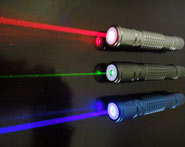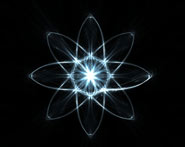


 الفيزياء الكلاسيكية
الفيزياء الكلاسيكية
 الكهربائية والمغناطيسية
الكهربائية والمغناطيسية
 علم البصريات
علم البصريات
 الفيزياء الحديثة
الفيزياء الحديثة
 النظرية النسبية
النظرية النسبية
 الفيزياء النووية
الفيزياء النووية
 فيزياء الحالة الصلبة
فيزياء الحالة الصلبة
 الليزر
الليزر
 علم الفلك
علم الفلك
 المجموعة الشمسية
المجموعة الشمسية
 الطاقة البديلة
الطاقة البديلة
 الفيزياء والعلوم الأخرى
الفيزياء والعلوم الأخرى
 مواضيع عامة في الفيزياء
مواضيع عامة في الفيزياء|
Read More
Date: 18-5-2016
Date: 30-12-2016
Date: 21-9-2020
|
Definition of Temperature
Our initial experimental definition of temperature was the ideal gas thermometer, which, as we saw from the derivation of the ideal gas law, is based on the thermal kinetic energy of the particles. The simple idea of absolute zero was the point where all the thermal kinetic energy was gone and the atoms were at rest. Now we see that no matter how much thermal kinetic energy we try to remove, zero point or "quantum kinetic energy" remains. This is not a problem at ordinary temperatures, but it can significantly affect the behavior of matter at temperatures close to absolute zero.
At low temperatures, the ideal gas thermometer is not adequate, and a new definition of temperature is needed. That new definition is provided by the efficiency of Carnot's heat engine.
This gives us a definition of temperature based, not on the kinetic energy of the molecules, but upon the degree of randomness or disorder. A system at absolute zero is as perfectly ordered as it can be. If zero point energy is required by the particle wave nature of the atoms, if it cannot be removed, then the most organized, least disordered state of the system must include this zero point energy. Helium can go to its most ordered state at absolute zero, retain its zero point energy, and remain a liquid.



|
|
|
|
5 علامات تحذيرية قد تدل على "مشكل خطير" في الكبد
|
|
|
|
|
|
|
لحماية التراث الوطني.. العتبة العباسية تعلن عن ترميم أكثر من 200 وثيقة خلال عام 2024
|
|
|